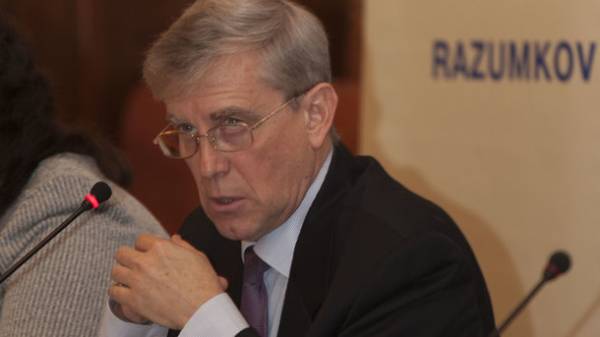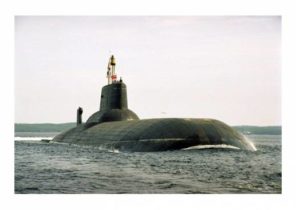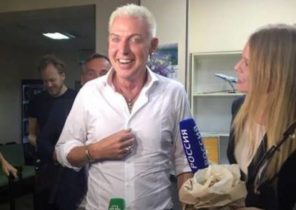
This Friday – July 7 – Hamburg, Germany kicks off the two-day 12th summit of the Big twenty. It is no exaggeration to say that after the G7 summit it will be the most rich in political news and also a debriefing at the highest level. And all this applies to American politics and President of the USA of Donald trump. European leaders do not hide their dissatisfaction about the attitude of the leader of the States to NATO, and a few days ago in his article for the New York Times former Chairman of the European Parliament Martin Schulz wrote that “the American people elected a President who hardly shows a respect for American values and the transatlantic partnership”.
Besides political issues, the summit could expose and acute political controversy. According to the influential German publication Spiegel, the unpredictable, the us President risks turning a prestigious meeting of world leaders in the fiasco, which threatens to turn into a trade conflict United States and the EU. “Almost nine years ago at the height of the financial crisis, the 20 largest world economies agreed to undertake programs to stimulate economies and to fight together against tax evasion. But now the Administration refuses to trump many of the agreements reached “the Big twenty” – the article says Spiegel.
In the official presentation of the priorities of the G20 summit, German Chancellor Angela Merkel says that the global economy and trade will be the Central topic of discussion by world leaders. In General, in the agenda of three key thematic blocks: strengthening resilience to economic shocks (world economy, global trade, employment, financial markets and tax cooperation), improving sustainable development (climate and energy, digitalization, implementation of the UN agenda until 2030, health care and the empowerment of women) and capacity-responsibility (addressing the causes of forced migration, counter-terrorism, anti-corruption, partnership with Africa, ensuring agro-food security). It is the partnership with Africa Germany, as presidency of the G20 country will pay attention. Because, as you said in an interview with “Today” former Prime Minister of Lithuania Andrius Kubilius, official Berlin has developed a Marshall Plan for Africa.
Preparing the agenda of the summit club “twenty” thousands, if not tens of thousands of experts from around the world. Over the past six months in Berlin after seven expert forums on the topics which are included in the agenda of the G20 summit. On one of these forums may 29-30 in Berlin, which was attended by more than 900 experts and analysts from more than 100 countries discussed the issues of migration, climate, cyber-security, trade and investment. According to a research consultant on economic issues Razumkov Center Vladimir Sidenko, who was represented at this forum of Ukraine, the center of attention of world experts was the climate and in this context – the consequences of the US withdrawal from the Paris climate agreement, the world economy and global trade, as well as new technologies and high-tech businesses. But about Ukraine and Russian aggression reminisced a little.
In an interview with “Today” Volodymyr Sidenko said, why the Russian aggression against Ukraine discusses the “Big seven” why we need to take action to reduce CO2 emissions, and what to do not to be on the periphery of the world economy.
– Tell us what was discussed at the expert forum on July 29-30 in Berlin? Whether all the recommendations of the experts included in the agenda of the G20 summit?
– At the last meeting of the T20 (Think20 Dialogue Forum – Ed.) held on may 29-30 in Berlin, was attended by about a thousand people from about a hundred countries of the world. I was the only one, as I understand it, a participant from Ukraine. The T20 summit, and summits, other non-state actors affiliated with the G20 (business representatives, civil society, trade unions, women, youth), develop recommendations for “Twenty” at the highest level. Such a consolidated document T20 “20 Solution Proposals for the G20” (“20 proposals for the G20 decisions” – Ed.) – General recommendations of the summit, which was presented to the head office of the German Chancellor and the Minister for special assignments Peter Altmaier. And four speakers at the conference, representatives of the German government show that it was potreniruetes Chancellor. That is, all the results of the study were used by the staff for the preparation of the G20. I’m not saying that the agenda of the G20 summit will coincide with the conclusions of this paper. But between them there is a high degree of compliance. And these five priority areas, which are designated T20, most likely, and will be the basis for discussion: digitalization – digitalization…
– And here, perhaps, will rise the issues of cybersecurity?
– Of course. The digitalization can not be implemented in the absence of security guarantees, to avoid such things that occurred recently in Ukraine and other countries of the world. The second issue is the building of a stable and resilient to shocks in the global economy. Moreover, special emphasis is paid to the relationship of economic and social change – the economy in many countries has stopped working on improving the welfare of citizens.
That is, she now works for a large Corporation?
– It turns out that she works more for powerful most wealthy circles.
The third issue that will be raised at the G20, climate policy and financing.
Leaders focus on U.S. withdrawal from the Paris climate agreement…
– Yes, this is a key question, and I think there will be great controversy.
The fourth issue is the fight against hunger, reduction of inequality, which deepens, and the management of forced migration.
And the fifth issue of the agenda to 2030 – universal document aimed at ensuring prosperity for all countries, not elected. According to the forecasts, up to 2030 will occur fundamental technological changes in the world that will rapidly create a new production, while destroying old jobs. And countries that do not fit into these processes, we risk remaining on the periphery of not only economic but also social development.
– Let us dwell in detail on matters of the economy. Certainly, in Berlin at the end of may and in Hamburg in the beginning of July to discuss the issue of sanctions?
– I’m probably a little bit disappoint, the subject of sanctions literally sporadically there were a couple of times and was not the center of attention. You need to consider that the format of “twenty” is a little different from the format of “seven”. If “the seven” the question of sanctions in recent years, we constantly hear, in the format of “twenty”, he goes into the shadows. Many developing countries do not show him enough interest. Moreover, there are some countries which with Russia in the partnership.
Just we like to say that the German business complains, asks for the lifting of sanctions to return to business as usual.
And this, too, may sound, they seem to evade the question round – here it is impossible to reach consensus. Therefore, these questions give “seven”, here you please and decide.
But to criticize the United States for withdrawal from the Paris climate agreement will be exactly.
– In steps, which made trump in this matter, there was no need. The Paris agreement is very flexible and does not impose any mandatory requirements. Each country is free to choose the format and scope of obligations. It seems to me that here (in the United States – Ed.) it was more political propaganda than a pragmatic and reasonable approach. More than 90% have been published in recent years studies show the increase of anthropogenic influence on the atmosphere. Numerous studies by American scientists show that CO2 emissions in the atmosphere has reached unprecedented levels not just for the time of the observations, and for all the time estimates for many thousands of years. During a meeting of group T20 on this issue there was almost no serious dispute. Moreover, very serious people, and that a Nobel laureate in Economics Joseph Stiglitz, who is often quoted, and former chief economist of the EBRD, Nicholas stern, suggests that countries need to raise taxes on CO2 emissions. Ukraine is a big challenge. We have not just at times, and dozens of times to raise taxes on carbon emissions to fit into the global framework recommended in this area.
But according to various estimates, emissions of Ukraine and so much lower European, why then should we raise taxes?
– They are indeed lower, but the Ukrainian GDP is significantly below the level of even 90’s. And proud of it did not need to evolve. But if we are going to develop in the old coordinate system, the emission level will grow significantly. We must therefore develop on the basis of new technologies that will reduce even today’s emissions of about 35%. And that, above all, energy efficiency measures, the use of new energy sources that are not associated with CO2 emissions (share of all alternative energy sources (solar, wind and biomass) in the structure of electricity production in Ukraine for 5 months. 2017 is 1.1%, which is no good), renewable and carbon-free energy sources.
– Do not You think that at the G20 summit trump could offer an alternative to the Paris climate agreement?
– You can offer anything, but I don’t think he will find support among the European countries, who in this issue present a United front. Moreover, anti-China, so today he is very actively developing alternative energy. In those discussions, which was in Berlin, where the United States was represented by four Nobel laureates, it is seen that against the decision of the trump act and in the States themselves. You cannot build a policy in favor of some small group of energy companies that are interested in reducing their costs.
– There have already been allegations that the G20 trump intends to discuss the beginning of deliveries of us liquefied natural gas to Europe to reduce dependence on Russian energy.
– Today the U.S. Administration is in first place business interests: increase its presence in the markets of the EU and the creation of jobs in the United States, the debt burden at the expense of export growth, etc.
But Europe in this respect its own, slightly different position. They apparently are not against reducing dependence on Russian supplies. But they will not put all your eggs in one basket. So I don’t think that the Europeans will replace one monopoly (“Gazprom”) to others.
Well, the question of the price: “Gazprom” recently has a policy of reducing prices, so the question is: will the supply of liquefied natural gas from overseas is cost effective.
– Lately a lot of talk about the Marshall Plan for Ukraine. In an interview with “Today” former Prime Minister of Lithuania Andrius Kubilius said that their “New European plan for Ukraine” was supported by the Congress of the European people’s party. The plan presented in the high offices of Brussels and Berlin. What you heard on the T20 summit discussed a plan of economic support of Ukraine?
– Problems of Eastern Europe was discussed through the prism of global security issues. On the local issues to the attention not concentrated. We are talking about that less-developed countries, Ukraine in particular, require significant financial resources. The same implementation of the Association Agreement requires billions in foreign currency. But it is not necessary to resort to more large-scale external investments. According to estimates of the Bank associations, we have about $ 100 billion rotates outside the banking system, which can be levied on domestic investment. But for this the government should create a favourable investment climate. Without this condition, nothing happens, even with the “Marshall Plan for Ukraine”.
– “Today”, referring to the report of the Razumkov Center wrote that in the next year without foreign investment Ukraine could be on the verge of default.
– Theme default occurs periodically. What lies under it in this case? Beginning in the fall of 2017 is the trend in the increase in the volume of external payments. But the source of these payments remains unclear. Any loans work when inside the economy is something created that serves as a source of repayment. While we live at the expense of refinancing old loans with new. Even the widely publicized restructuring of non-government external debt is still a debt deferment. But we have to use the loan funds effectively to produce a competitive industry, capable at the expense of their supply to foreign markets high-value products to establish a base for earnings country currency. Otherwise, there will actually be a period when we will not be able to service its external debt. Because any process of borrowings, if there is no repayment sources, creates a vicious circle, and there comes a time when the country can not continue to pay. But for us it’s not just a matter of financial default, but the default of all policy. We will not be able in this case to Fund the implementation of the Association Agreement with the EU. In our confrontation with the Russian Federation is also an important factor. Therefore, the issue of investing in new technology – not only in technique, but in the relevant management system processes – a key point for development policy of the country and its security.







